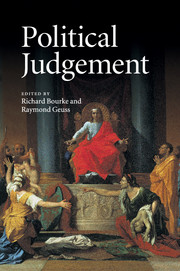Book contents
- Frontmatter
- Contents
- List of contributors
- Acknowledgements
- Introduction
- Part I The character of political judgement
- Part II Trust, judgement and consent
- 4 On trusting the judgement of our rulers
- 5 Adam Smith's history of law and government as political theory
- 6 Marxism in translation: critical reflections on Indian radical thought
- Part III Rationality and judgement
- Part IV Democracy and modern political judgement
- Bibliography of the works of John Dunn
- Index
5 - Adam Smith's history of law and government as political theory
from Part II - Trust, judgement and consent
Published online by Cambridge University Press: 26 December 2009
- Frontmatter
- Contents
- List of contributors
- Acknowledgements
- Introduction
- Part I The character of political judgement
- Part II Trust, judgement and consent
- 4 On trusting the judgement of our rulers
- 5 Adam Smith's history of law and government as political theory
- 6 Marxism in translation: critical reflections on Indian radical thought
- Part III Rationality and judgement
- Part IV Democracy and modern political judgement
- Bibliography of the works of John Dunn
- Index
Summary
The burden of judgement: Dunn, Kant and Locke
In all his work John Dunn has insisted that political judgement must be regarded as a central issue of political theory. Nonetheless, only a few political theorists work explicitly on this topic. Among them Dunn is perhaps the only one who stands entirely outside the Kantian tradition. This is a striking fact, for Kant's contribution is widely regarded as foundational for the understanding of judgement (moral, aesthetic and political) in modern thought. Judgement is usually defined with reference to Kant's pithy characterisation of it in his Critique of Judgment as ‘the ability to think the particular as contained under the universal’, as the link between theory and practice. ‘It is obvious’, Kant claimed in his essay ‘On the common saying: That may be correct in theory, but it is of no use in practice’, that ‘between theory and practice there is required … a middle term connecting them and providing a transition from one to the other’, an ‘act of judgment by which a practitioner distinguishes whether or not something is a case of the rule’.
Kant's essay conveyed a double-edged message about the problem of judgement. At first Kant asserted that there was an ineliminable gap between theory and practice which could not be closed by developing a theory of judgement. Judgement as such could have no rule, for a rule was precisely a theory, requiring a further judgement for its implementation as practice. This would lead to infinite regress. In Kantian terms, a theory of judgement was an oxymoron.
- Type
- Chapter
- Information
- Political JudgementEssays for John Dunn, pp. 131 - 171Publisher: Cambridge University PressPrint publication year: 2009
- 24
- Cited by

